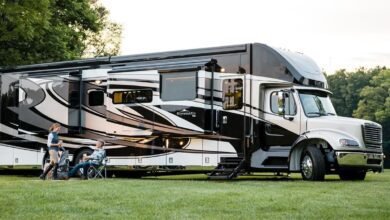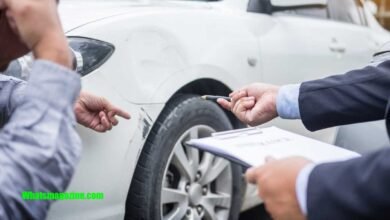You’ve already planned out the first stop in your RV next spring: Meteor Crater in Arizona. Now, you just need an RV.
Research shows that as many as around 25 million people in the United States travel in their RVs during the summer and spring seasons. And you can’t wait to hop on the bandwagon.
Before you join the RV club, though, you need to know what to look for when buying an RV. Fortunately, we’ve outlined the top seven things to look out for in an RV in this RV buyers guide, so let’s get started.
In this article
1. Mold Issues
If you’re looking to buy an RV, one of the most important problems to look for is mold.
Unfortunately, RVs are highly vulnerable to mold issues if they aren’t maintained properly. If climate control and ventilation are lacking, moisture may gather in hard-to-see places. For instance, water could form behind drawers or under mattresses.
This water may then become mold, which might ruin any furniture and wood in the RV. Mold could also lead to health problems. So, double-check your prospective RV’s many compartments and hidden surfaces to make sure that mold hasn’t formed there.
2. Damaged Caulking
The top RV buying tips also include looking for any damaged caulking on your potential RV.
For instance, if possible, consider climbing up to your potential RV’s roof to assess the caulking. If you notice that caulking is crumbling around the seams and vents, this means that the RV might have water leaks.
If water enters an RV through cracked or crumbling caulking, this can quickly cause severe damage. Signs of this problem include mold as well as rotting structural supports and walls. They also include fiberglass delamination, or warping, where the fiberglass begins to separate from the RV’s backing material.
Crumbling caulking does not automatically mean that an RV has issues, but it is a major red flag that warrants further investigation.
3. Rust Issues
RV components may also experience rust issues, so be on the lookout for corrosion when checking out an RV for sale.
Rust can be a problem due to natural salts as well as the salt placed on highways in snowy weather. Many rust problems can easily be resolved with a rust-preventative spray and wire brushes.
However, if you see rust on an RV’s frame and suspension components, this may be a sign of structural failure, in which case buying the RV may not be a wise idea.
4. Engine Issues
Yet another potential RV problem to look for is an engine problem.
For instance, be wary of an RV with obvious wear and splatters of grease and oil. Also, steer clear of an RV whose belts look worn.
If you buy an RV with engine issues, you may end up being stranded when you should be enjoying the great outdoors. The stress that RV engine problems may cause can be even greater if you ever plan to make your RV your primary residence.
5. Damage to the Awning
When shopping for an RV, pay close attention to the condition of a potential RV’s awnings as well.
RV awnings are important, as they provide both shade and rain protection. For this reason, you should avoid buying an RV whose awnings are heavily ripped or can’t extend.
To check a prospective RV’s awnings, open the awnings as well as the slide toppers. Then, look for damage signs, such as tears, rips, and punctures. Also, if the awnings are electric, make sure that the motor is operational, allowing the awnings to go out and in.
If you want to learn more about RV awnings and other popular RV features today, check out the site of the RV dealership in La Mesa for more info.
6. Damage from Water
Damage caused by water is another major problem to look for in an RV. An RV may experience this type of damage due to improper maintenance and faulty seals.
This damage may occur behind walls or in other hidden areas, so it can be easy to miss. To increase your chances of detecting it, look for water damage or pooling water in corners and along seams.
7. Propane Leak
Finally, look out for propane leaks in all of the RVs you assess before you make your buy.
Propane is extremely flammable, and it can also cause carbon monoxide poisoning in anybody in an RV. However, it is a must-have in an RV, as it’s used to power water heaters, refrigerators, and stoves.
When checking out an RV, try to run the vehicle’s propane appliances to ensure that they work properly. If you notice a strong propane odor, open the windows and doors right away. Then, turn the RV’s propane supply off.
Even if you don’t smell propane, you should make sure that the RV you’re interested in buying has a propane detector in it. These types of detectors are usually mounted near the floor. Ideally, the detector should also have batteries in it, but if it doesn’t, this is something you can easily purchase later if you choose to buy the RV.
Approach Buying an RV with Confidence
There are a handful of things that shouldn’t be missed when you’re buying an RV. From the RV battery’s condition to the status of the tires and awning, several aspects of your prospective RV should be evaluated in detail to ensure a smart buy.
Consider the above-listed top RV buying tips as you search for the perfect RV for making your future dream vacations a reality mile after mile.
Also, if you enjoyed reading this article, check out the rest of our website for more great content.











